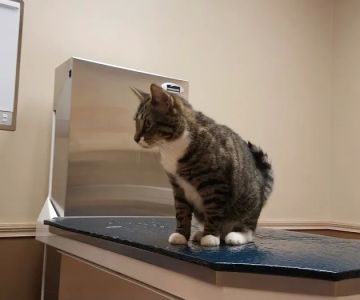- 1-Understanding Your Pet’s Gastrointestinal Health
- 2-Common Gastrointestinal Issues in Pets
- 3-Dietary Tips for Supporting Digestive Health
- 4-The Role of Probiotics in Pet Digestion
- 5-The Importance of Regular Veterinary Checkups
- 6-Real Story: How Proper Digestive Care Transformed My Pet’s Health
- 7-Conclusion: Maintaining Your Pet’s GI Health
1-Understanding Your Pet’s Gastrointestinal Health
Your pet’s gastrointestinal (GI) health is an essential aspect of their overall well-being. The digestive system plays a vital role in processing food, absorbing nutrients, and eliminating waste. Just like humans, pets can suffer from digestive issues that impact their energy levels, comfort, and quality of life. Managing your pet’s gastrointestinal health involves paying attention to their diet, exercise, and recognizing early signs of digestive distress.
Understanding the basics of GI health is the first step in ensuring that your pet remains happy and healthy. The digestive system consists of the stomach, intestines, liver, and pancreas—all working together to process the food your pet eats. When this system is functioning well, your pet will thrive. However, digestive issues can arise due to various factors, such as poor diet, stress, or infections. By recognizing the signs of distress and taking proactive measures, you can help keep your pet’s digestion in check.
2-Common Gastrointestinal Issues in Pets
Just like humans, pets can experience a range of gastrointestinal issues. Here are some of the most common problems that can affect your pet’s digestive health:
- Vomiting: Vomiting can be caused by various factors, such as food allergies, infections, or even stress. If your pet is vomiting frequently, it’s important to consult a veterinarian.
- Diarrhea: Diarrhea is a common digestive issue that can occur for several reasons, including changes in diet, infections, or parasites. Persistent diarrhea can lead to dehydration, so it’s essential to address it quickly.
- Constipation: When your pet is having difficulty passing stool, it could be due to a lack of fiber in their diet or underlying health conditions. Constipation can cause discomfort and should be addressed promptly.
- Flatulence: Excessive gas can be a sign of digestive imbalance. It may be caused by dietary changes or intolerance to certain foods.
- Food Sensitivities: Some pets may have sensitivities or allergies to certain foods, leading to digestive discomfort, bloating, and other GI issues.
Recognizing the symptoms of these issues early on can help prevent further complications. Regular monitoring of your pet’s digestive health will ensure that you can act quickly if problems arise.
3-Dietary Tips for Supporting Digestive Health
One of the most effective ways to manage your pet’s gastrointestinal health is through their diet. A balanced, nutrient-rich diet plays a significant role in keeping your pet’s digestive system functioning properly. Here are some dietary tips to help support your pet’s GI health:
- Provide High-Quality Food: Feed your pet a high-quality, well-balanced diet tailored to their age, size, and activity level. Look for food that contains natural ingredients, healthy fats, and a balanced amount of protein, fiber, and carbohydrates.
- Incorporate Fiber: Fiber helps to regulate digestion and can prevent constipation and diarrhea. Ensure that your pet’s food contains adequate fiber from vegetables, grains, or supplements.
- Consider Special Diets for Sensitive Stomachs: If your pet suffers from food sensitivities or allergies, you may want to opt for a special diet designed for sensitive stomachs. These diets typically contain easily digestible ingredients that won’t irritate the digestive system.
- Avoid Table Scraps: While it may be tempting to share your food with your pet, human food can upset your pet’s stomach, leading to vomiting, diarrhea, or other issues. Stick to pet-safe treats and meals.
4-The Role of Probiotics in Pet Digestion
Probiotics are beneficial bacteria that help maintain a healthy gut microbiome. Just as in humans, probiotics can play a vital role in your pet’s digestive health. They can help restore balance to your pet’s digestive system, particularly if they’ve experienced issues such as diarrhea or constipation.
Probiotics support digestion by enhancing nutrient absorption, reducing inflammation, and promoting a healthy immune system. Adding probiotics to your pet’s diet—whether through specially formulated pet food, supplements, or natural sources—can improve their overall digestive function. Talk to your veterinarian about the best probiotic options for your pet to support their gastrointestinal health.
5-The Importance of Regular Veterinary Checkups
Regular veterinary visits are crucial for managing your pet’s gastrointestinal health. Your veterinarian can help diagnose underlying issues, recommend appropriate dietary changes, and provide treatment options for digestive problems. During checkups, your vet may perform a physical exam, run lab tests, and review your pet’s diet and lifestyle to ensure that their digestive health is on track.
Don’t wait for symptoms to worsen—proactive veterinary care can help detect issues early, preventing long-term complications and ensuring your pet’s gastrointestinal system stays in good condition.
6-Real Story: How Proper Digestive Care Transformed My Pet’s Health
A few months ago, my dog, Max, started experiencing frequent vomiting and diarrhea. I was worried and immediately took him to the vet, who diagnosed him with food sensitivities. We switched to a specialized diet, incorporated probiotics, and made sure to avoid certain foods that triggered his digestive issues. Within a few weeks, Max’s condition improved significantly, and he was back to his energetic self. Managing his GI health with the right diet and supplements made all the difference in his overall well-being.
This experience reminded me of the importance of regular veterinary visits and the role of proper nutrition in maintaining digestive health. With the right care, your pet can lead a happy, healthy life.
7-Conclusion: Maintaining Your Pet’s GI Health
Managing your pet’s gastrointestinal health is essential to ensuring they live a long, happy, and comfortable life. By providing a well-balanced diet, incorporating probiotics, and scheduling regular veterinary visits, you can help prevent and manage digestive issues before they become serious problems. Always keep an eye on your pet’s symptoms, and don’t hesitate to seek professional advice when necessary.
If you’re looking for expert recommendations on maintaining your pet’s gastrointestinal health, visit Hidden Brook Veterinary. We offer a wide range of products, services, and advice to ensure your pet stays healthy and happy.











